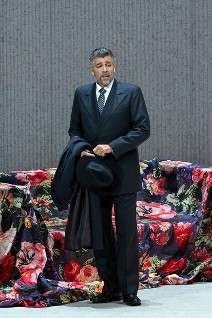|
Back
Traviata Drags at the Met New York
Metropolitan Opera
02/24/2017 - & March 1, 4, 7, 11, 14, 18, 22*, 29, April 1, 4, 8, 11, 14, 2017
Giuseppe Verdi: La traviata
James Courtney (Doctor Grenvil), Carmen Giannattasio*/Sonya Yoncheva (Violetta), Jeff Mattsey (Marquis d’Obigny), Edyta Kulczak (Flora), Dwayne Croft (Baron Douphol), Scott Scully (Gastone), Atalla Ayan/Michael Fabiano* (Alfredo), Maria Zifchak (Annina), Plácido Domingo/Thomas Hampson*/Nelson Martínez/George Petean (Germont)
Metropolitan Opera Orchestra and Chorus, Nicola Luisotti (conductor)
Willy Decker (production), Wolfgang Gussmann (sets and costumes), Hans Toelstede (lights), Athol Farmer (choreography)

T. Hampson (© Marty Sohl)
Standard repertoire at the Met strikes a tricky balance. This revival run of La Traviata, an impressive batch of fourteen performances, will see Verdi’s tragic tale of love and sacrifice pass the mark of one thousand performances in the company’s history (the performance under review was the 1,004th). Can crowd pleasing favorites stay fresh? Willy Decker’s production, original to the Salzburg Festival, has never really caught on. Its stylized approach is dominated by a huge clock that suggests Violetta’s time on earth is winding down. The costumes are more or less modern, with the heroine in striking red and the chorus in plain black. Act II is dominated by the camellias of Alexandre Dumas’s original literary work. The opera ends with cool violets and blues projected behind the dying heroine.
For all of its more obvious features, Decker’s production does allow sopranos wide latitude for interpretation. On March 22 the split cast yielded the role from rising star Sonya Yoncheva to the subtler yet nevertheless celebrated Carmen Giannattasio. Under the direction of Nicola Luisotti, she took a staid approach. This Violetta is no raging party girl or out of control alcoholic, but rather a very modern women possessed by great insecurity. However “real” or psychologically interesting, the unfortunate effect was to vitiate the music. “Sempre libera,” the famous first act cabaletta, was curiously restrained for what the role demands and for what Giannattasio’s voice can do. It was really only in the final act’s plaintive “Addio del passato,” a dying woman’s last gasp of regret, that the singing proved enjoyable or appropriate to the drama.
The young tenor Michael Fabiano has had a lot of buzz about him, and his past Alfredos were stirring. Here, however, he never quite delivered a star performance. High notes remained elusive or unattempted, the drama paled. Thomas Hampson’s Germont, however, stood out among the principals for its insistently high quality. Though no longer adept in every role he attempts, the veteran baritone lacked nothing in either voice or acting in his portrayal of a demanding yet ultimately comforting father. The Met’s supporting singers filled out the remaining cast nicely. Luisotti’s tempi were too slow for my taste, and the recharacterization of the opera’s heroine sacrificed too much to a subtlety that was far from necessary. It is glumly regrettable to have to register disappointment with such a fine conductor.
Paul du Quenoy
|